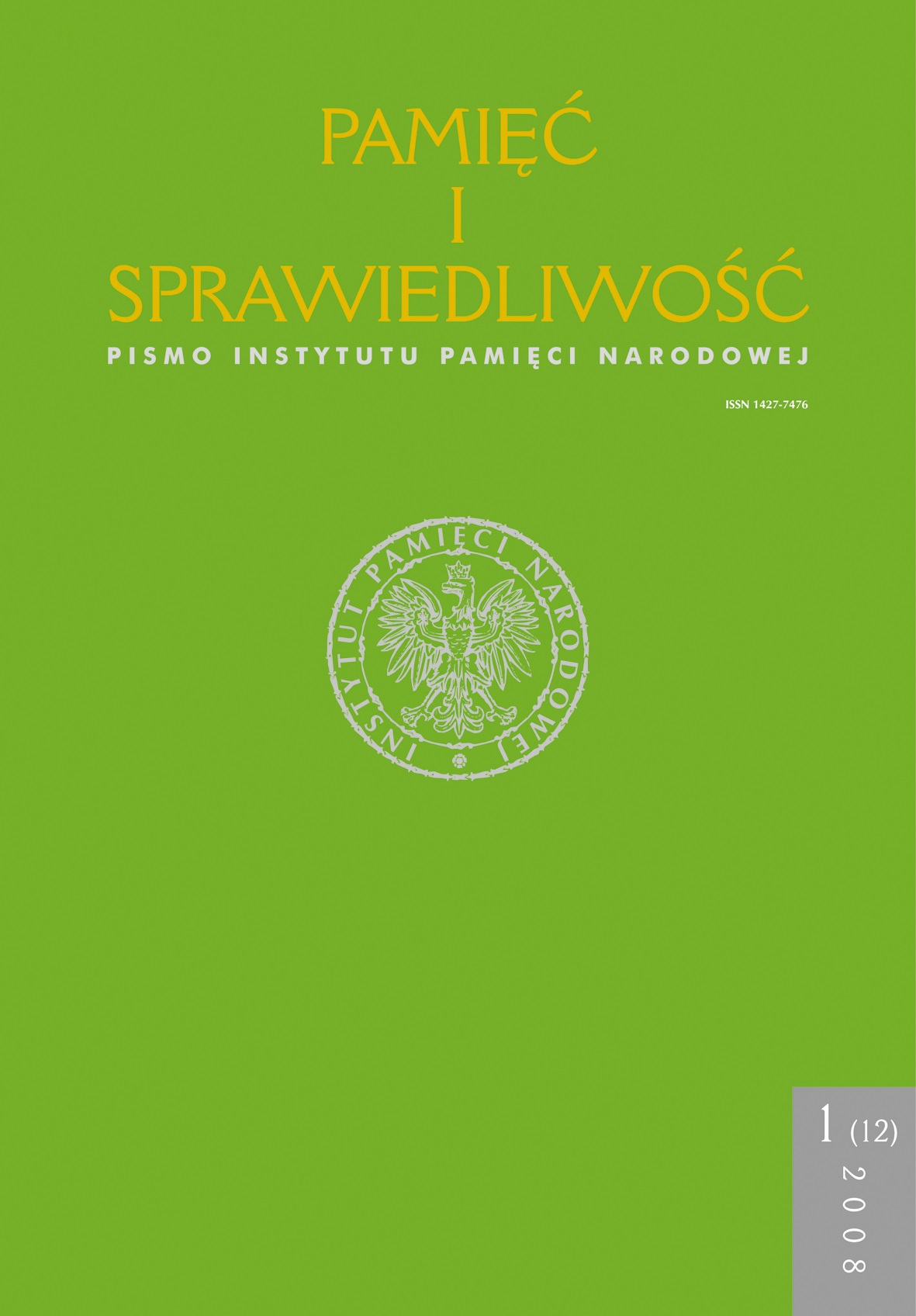Z dziejów komunistycznego wywiadu. Casus Bogusława Hrynkiewicza i Mariana Spychalskiego (1940–1944)
Pamięć i Sprawiedliwość, Tom 12 Nr 1 (2008), strony: 199-228
Data publikacji: 2008-06-30
Abstrakt
The main hero of the article is Bogusław Hrynkiewicz, a would-be lawyer
actively operating in the communist movement in Poland from 1929. In the middle of 1940, escaping from German army, he arrived to Białystok. The NKVD officer contacted him there. Hrynkiewicz started co-operation with the Soviet intelligence – he collected information on Polish underground organizations. In the summer of 1942 he became a member of one of them – a right wing organization ‘Sword and Plough’ (“Miecz i Pług”). Within a couple of months he became a member of its managing organs. He acquired the access to the intelligence materials
of the organization on the German army and power apparatus. At the same time he operated to liquidate the organization. Finally, he contributed to sentencing the leaders of the ‘Sword and Plough’ to death and executing them.
In the summer of 1943 he started the co-operation with Marian Spychalski – the head of the intelligence of the People’s Guard (Gwardia Ludowa, later People’s Army – Armia Ludowa, AL). At the same time he contacted a Gestapo officer, Wolfgang Birkner, and the collaborator of Abwehra, Włodzimierz Bondorowski. Simultaneously, he started working for Wacław Kupecki – the employee of the Security Department of the District Delegation of the Government of the Republic
of Poland at Home (Wydział Bezpieczeństwa Okręgowej Delegatury Rządu RP na Kraj) for the city of Warsaw which kept the archives on the anti-communist intelligence (at ul. Poznańska 37). On 14 February 1944 Hrynkiewicz, having acquired the consent of Spychalski, supervised the attack on the archives carried out by two rank and fi le members of the AL, three collaborates of Bondorowski and the Gestapo offi cer being in command of the whole operation. Materials on communists were passed to Spychalski, who in the spring of 1944 took them to Moscow.
Spychalski and Hrynkiewicz also organized operations of denouncing the members of the Polish independence underground before Gestapo. On this occasion Spychalski contributed to a slip-up, which turned out to be disastrous for him. Via Hryniewicz he passed to Gestapo the address of the conspirational printing house of the Home Army (Armia Krajowa, AK). When the Germans entered the printing house, the AK members started fl eeing to the next building. And it happened that there was a communist printing house located in there. Germans arrested their employees.
After the War Spychalski and Hrynkiewicz landed in prison among others accused of collaborating with Gestapo and the AK. Hrynkiewicz was also in the NKVD prison, later he landed in the psychiatric hospital. After the political changes, which took place in 1956, the actions of both communists were again considered ’patriotic’.
Inne teksty tego samego autora
- Robert Spałek, Władysław Gomułka i „problem niemiecki” (refleksje do biografii polityka) , Pamięć i Sprawiedliwość: Tom 42 Nr 2 (2023)
- Robert Spałek, Jakub Berman. Portret politycznego emeryta w materiałach SB (1966–1971) , Pamięć i Sprawiedliwość: Tom 16 Nr 2 (2010)
- Robert Spałek, Statut Biura Specjalnego MBP , Pamięć i Sprawiedliwość: Tom 32 Nr 2 (2018)
- Robert Spałek, [Recenzja] W odpowiedzi Krzysztofowi Wyszkowskiemu , Pamięć i Sprawiedliwość: Tom 6 Nr 2 (2004)
- Robert Spałek, Włodzimierz Domagalski, [Recenzja] Robert Spałek, Warszawska ulica w stanie wojennym. Demonstracje, protesty, zamieszki, pochody w oczach opozycji i władzy 1981–1983, Wspólnota Samorządowa Województwa Mazowieckiego, Warszawa 2008 s. 266. , Pamięć i Sprawiedliwość: Tom 15 Nr 1 (2010)
- Robert Spałek, „Gracze” – Komitet Obrony Robotników w propagandzie PRL, stereotypach oraz dokumentach Ministerstwa Spraw Wewnętrznych , Pamięć i Sprawiedliwość: Tom 4 Nr 2 (2003)
- Robert Spałek, [Recenzja] W odpowiedzi na recenzję Włodzimierza Domagalskiego , Pamięć i Sprawiedliwość: Tom 15 Nr 1 (2010)
- Robert Spałek, Założenia, przebieg i cele naukowo-edukacyjne konferencji „Sprzeczne narracje. Historia powojennej Polski”, zorganizowanej przez Oddziałowe Biuro Badań Historycznych IPN w Warszawie 19–20 stycznia 2017 roku , Pamięć i Sprawiedliwość: Tom 30 Nr 2 (2017)
 Język Polski
Język Polski
 English
English
 Deutsch
Deutsch
 Français (France)
Français (France)
 Italiano
Italiano
 Русский
Русский


 PDF
PDF
